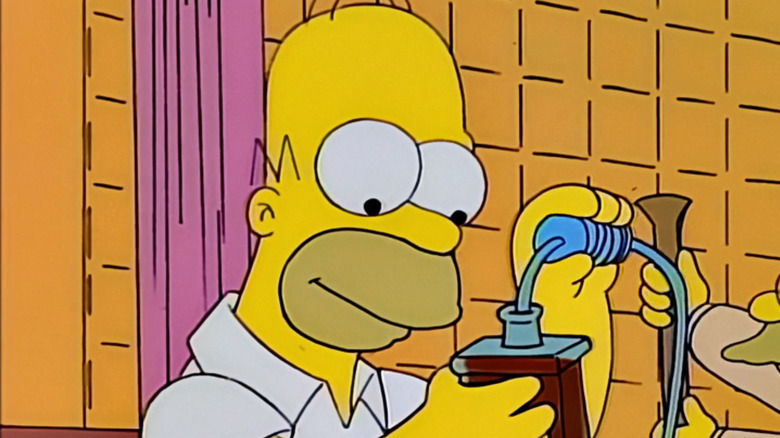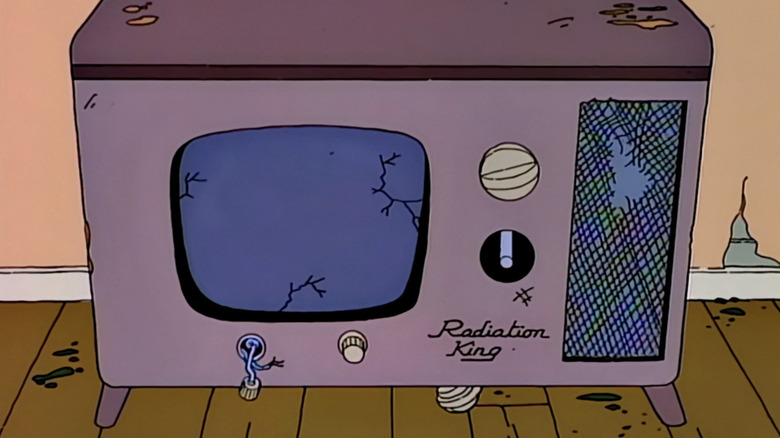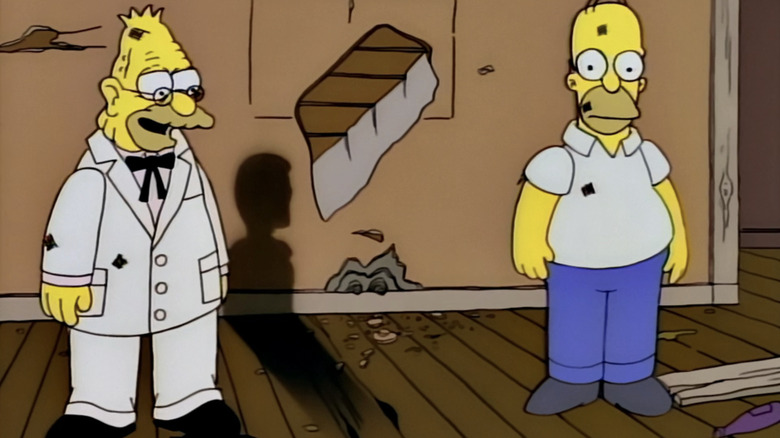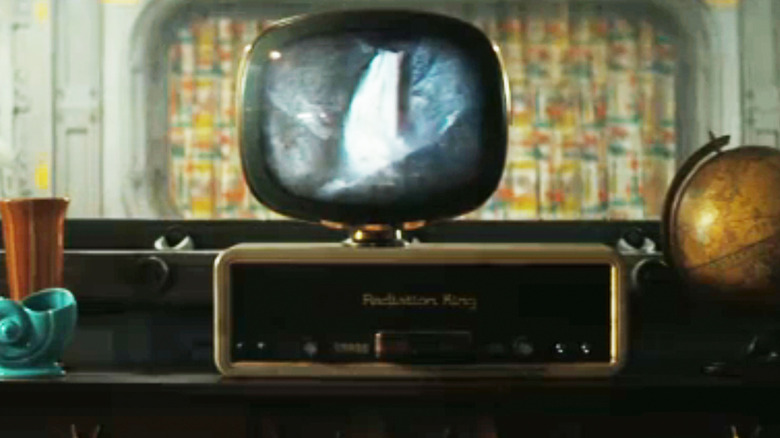An Old Simpsons Joke Snuck Its Way Into The Fallout TV Series
Everyone knows "The Simpsons" has basically predicted every major cultural moment in recent history. From Disney's 2021 acquisition of Fox to Donald Trump's presidency, the long-running show has managed to prove time and again that it has its finger on the pulse of pop culture — well, at least it used to. But the show is also responsible for directly contributing to other pop culture moments, such as when Merriam-Webster added the word "Cromulent" — first used in the 1996 episode "Lisa the Iconoclast" — to the dictionary.
Another '90s episode featured the origin of a minor "Simpsons" joke that would end up enduring for decades, although in a much less conspicuous way. "Grampa vs. Sexual Inadequacy" is the tenth episode of the show's sixth season, and while it didn't quite make /Film's list of the 25 best "Simpsons" episodes, frankly every golden age episode could have been on that list, and this one is no different.
Written by Bill Oakley and Josh Weinstein, this is the episode that gave us Paul Harvey's audiobook "Mr. and Mrs. Erotic American," the libido-restoring Simpson & Son Revitalizing Tonic, and of course, Al Gore being informed that someone, finally, bought his book, prompting his personal desk party set to "Celebration" by Kool & the Gang. What fans might not be aware of, however, is that the episode also contributed directly to the "Fallout" video game franchise, and even influenced a small part of Prime Video's "Fallout" TV series.
How The Simpsons influenced the Fallout games
In "Grampa vs. Sexual Inadequacy," first broadcast on December 4, 1994, Grampa tells Homer that his conception was essentially an accident, brought on by the revitalizing tonic he and Homer have been peddling as part of their traveling medicine show. This leads to the pair arguing, before reconciling at the end of the episode. But prior to their clash, they take a trip to the farmhouse where Homer was raised. During their visit, the pair walk through the living room where they find their original TV. "There she is, the old Radiation King," announces Grampa, before a wide shot reveals the shadow of a young Homer burned onto the wall of the room.
The brief sequence references how radium was used in many household items during the '50s, from toys to appliances, and more specifically refers to a line of GE televisions that, as The Atlantic points out, were found to be emitting "X-radiation in excess of desirable levels." But the joke also seems to play on the nuclear energy boosterism of the 1950s and '60s, when atomic power was promoted as holding the key to sustainable energy that would bring about a nuclear-powered utopia and would, according to then-Chairman of the Atomic Energy Commission, Lewis L. Strauss (yes, the same villain played by Robert Downey Jr. in "Oppenheimer"), be "too cheap to meter."
Of course, that kind of nuclear energy optimism was accompanied by widespread fears of nuclear annihilation, and the utopian vision of atomic energy being peddled by society's leaders at the time elided a much darker aspect to the whole thing. It's the same contradiction on which much of the "Fallout" video games are based, which might explain why one of the game's designers threw in a Radiation King reference.
How the Radiation King became Fallout canon
In an interview with No Mutants Allowed, "Fallout" game designer Leonard Boyarsky revealed that during the making of the first "Fallout" game from 1997, he "kept trying to sneak pop culture references" into the story, and included callbacks to everything from "Star Wars" to "The Simpsons." As the designer went on to explain, "I mostly tried to hide 'Simpsons' references wherever I could just to make Tim [Cain, 'Fallout' creator] laugh. The TV in the intro is a 'Radiation King,' for instance."
Little did Boyarsky know that his in-joke with Cain would become an ongoing part of the "Fallout" video games. After adding this lesser-known "Simpsons" gag into the first "Fallout" game, Radiation King products showed up in "Fallout 3," "Fallout: New Vegas," "Fallout 4," and "Fallout 76." What's more, entire Radiation King stores and factories have cropped up in various games, raising the extremely unsettling question of whether the Fallout games could be interpreted as occurring in some sort of twisted, post-apocalyptic "Simpsons" universe.
But yet another thing Boyarsky almost certainly wasn't expecting is that he would be indirectly responsible for ensuring a "Simpsons" joke made it back onto TV three decades after it first aired.
The Radiation King in the Fallout TV series
The "Fallout" games first arrived back in 1997, and it would be almost 30 years before the survival RPG series was adapted for TV. Thankfully, Prime Video's stellar 2024 adaptation "Fallout" was worth the wait. The show faithfully recreated the retrofuturist aesthetic of the games and became one of Prime Video's biggest ever hits in the process.
One part of that retrofuturist aesthetic that "Simpsons" fans and Leonard Boyarsky will be glad to know made it in the show was the good old Radiation King. Towards the end of episode six, entitled "The Trap," Aaron Moten's Maximus can be seen watching TV and eating popcorn. A closeup of the TV itself reveals that Maximus is indeed using a Radiation King model.
It might be a small detail, but it's pretty interesting to note how a 1994 joke made its way from network TV to a series of video games and then back onto TV screens as part of a streaming series 30 years later. The show is very faithful to the games, not just in terms of its look, but in the way it contains direct references to "Fallout" in-jokes, such as when it took a jab at the video games in episode 3. But whether the "Fallout" TV writers actually knew they were preserving a "Simpsons" joke or not, like Homer's shadow forever scorched into the wall of his childhood home, the Radiation King has become an indelible part of the "Fallout" franchise, and yet another example of the ongoing and widespread influence of "The Simpsons."



